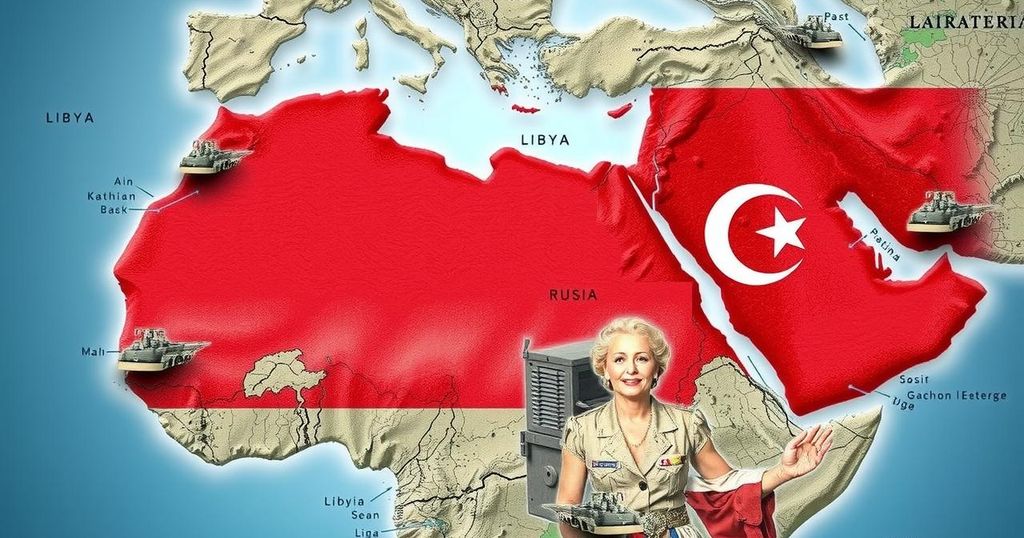Russia Shifts Focus to Libya as New Strategic Hub in Africa

Following the decline of Bashar al-Assad’s regime in Syria, Russia is redirecting its focus towards Libya, seeking to establish a new military foothold. The Kremlin is currently supporting Khalifa Haftar, a key figure in eastern Libya, while navigating the complex political landscape and competing foreign interests. This strategic shift aims to maintain Russia’s influence in Africa, although challenges persist due to Libya’s fractured politics and the presence of opposing powers like Turkey.
In light of the recent instability following the fall of Syrian President Bashar al-Assad, Russia is reportedly shifting its strategic focus towards Libya as a potential military foothold in Africa. With ports and air bases in Syria serving as critical operational hubs in the Mediterranean and beyond, the Kremlin now seeks to establish a new base of influence amid the uncertainty in Syria. Russian mercenaries currently back Khalifa Haftar, a prominent figure in Libya’s eastern region, as they engage in conflicts with the internationally recognized Government of National Unity (GNU) in Tripoli. The ongoing reshuffle in Syria has intensified Russia’s efforts to preserve its African engagements by redirecting military resources and personnel to Libya.
Recent investigations revealed significant military activity in Libya linked to Russian interests, with approximately 800 Russian troops reported as of February 2024, expanding to 1,800 shortly thereafter. Resources, including advanced radar and air defense systems, have reportedly been transferred from Syria to Libya, illustrating a substantial commitment to establishing a military presence in the region. Experts view this transition not merely as a replacement strategy but as an attempt by Russia to maintain a continuous influence within Africa, furthering Moscow’s long-term geopolitical ambitions.
Libya offers Russia a different operational landscape compared to Syria; it possesses a divided political structure that Moscow seeks to exploit. However, this comes with challenges, primarily due to the factionalized political environment and the presence of competing foreign powers, notably Turkey, which supports the GNU and has engaged with Haftar. The complexities in Libya necessitate that Russia remain cautious and build contingency plans, avoiding reliance on a singular ally, particularly after its experiences in Syria. Consequently, Russia’s future endeavors in Libya will require navigating the complicated politics of the region while mitigating the adversities posed by Western influences and regional powers.
The strategic importance of Libya has been heightened in the context of Russia’s military strategy following the geopolitical shifts caused by the fall of Bashar al-Assad’s regime in Syria. As Assad’s influence wanes, Russia’s established operations in Syria, essential for projecting military power across the Mediterranean and into Africa, are becoming precarious. The Kremlin’s pivot to Libya signals a broader effort to maintain its foothold in Africa, particularly in conflict-prone areas where it can extend its influence amid rival interests from Western nations and regional powers. Libya’s fractured political landscape, marked by competing factions, provides an opportunity for Russia to assert its presence without succumbing to the complexities that hamper its influence in Syria.
In summary, Russia’s strategy to redirect its focus from Syria to Libya underscores its urgent desire to maintain influence in Africa amidst evolving geopolitical dynamics. This transition is marked by a significant increase in military assets and personnel in Libya as Moscow capitalizes on the country’s divided political landscape. However, the complexities of Libyan politics, coupled with competition from external powers, suggest that Russia will face heightened challenges in establishing a comparable foothold to that which it enjoyed in Syria. Future engagements will require strategic flexibility and a careful balancing act to navigate the multifaceted geopolitical environment in the region.
Original Source: www.france24.com






